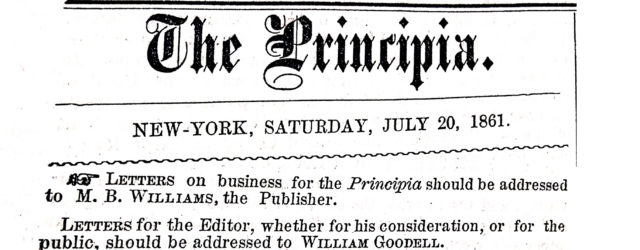“I have been editor in chief . . . what do you think of that?”
We want good original matter very much. Poor me! I have to “stand in the gap” and supply when others fail. I wouldn’t care if I could suit myself, but I do want our paper to be so extra good that I am always dissatisfied with my attempts.
Lavinia Goodell, November 2, 1862
From 1859 until early 1865, Lavinia Goodell’s father was the editor of the New York Principia, a weekly anti-slavery newspaper. The paper’s offices were located in lower Manhattan. The masthead proclaimed that the publication stood for “First Principles in Religion, Morals, Government, and the Economy of Life.”

Lavinia began writing short pieces for the Principia in late 1859. Her early contributions to the paper appeared under the column “Family Miscellany” with the byline “Housekeeper.” In early 1862, Lavinia reported to her sister Maria, “I always spend a day in a week at Father’s office. Every evening I read proof and the newspapers for him, so I find plenty to occupy me.” By late 1862 Lavinia had been given full responsibility for “Family Miscellany” as well as the “News page,” “the War,” “Foreign” and “Miscellaneous” departments. She wrote Maria:
What do you think of our “Family Miscellany” generally? Is it good? You know I have charge of that department, and am anxious to know how it takes. If you have any criticisms, please favor me with them…. I like my occupation very much.
As time went on, Lavinia started to sign some of pieces “L.” or “L.G.” A handful were signed “Lavinia G,” but it does not appear that any bore her full name. She seemed to relish the anonymity since it gave her license to write on topics that would not normally be tackled by women:
I have started on a new theme, you will see, and a funny one for a young lady to hold forth upon. But then people generally won’t know it’s me, you know, and I think it is a fruitful theme. Young ladies are lectured to quite enough and it is time the “opposition” got a little.
By 1863, Lavinia had taken on even greater responsibility at the paper. She was paid a salary, and her father had gained enough confidence in her abilities to occasionally put her in charge in his absence. She described the Principia’s headquarters and her recent temporary promotion to Maria:
Here I am at my accustomed desk, in the editorial sanctum — the dear old nook long hallowed by successions of proof-readings, revisings, war and miscellany luminaries, and daily newspaper researchers…. [W]e have a large, long room with two front windows, and a glass partition between us and Mr. Alden’s apartments. Two large desks stand side by side; the one nearest the window father’s, the other mine. There are also two large wooden tables, partially covered with papers, and wholly covered with ink stains, traces of pens and pencils, and sometimes dust. There is also a spring seated lounge, on which the Senior Editor frequently catches a short nap, after dinner, and a long row of shelves filled with books and papers. A carpet somewhat the worse for wear, and which has lost the facility of not showing dirt, covers a portion of the floor. A cylinder stone in the center of the room completes the picture unless I add the tableau of a pale, blue-eyed brown-ringletted girl of some 23 summers, who is seated at her desk, writing a letter to her sister. What say you to my daily life and surroundings? It has its sunny and shady sides, like everything else on this revolving sphere; for my part, though, I confess I prefer preparing mental aliment to physical, and like the stir and excitement of city surroundings.
Since Friday Father has been confined at home, and I have been editor-in-chief, with Dr. Cheever for a sub! What do you think of that?
We have been able to identify approximately forty of Lavinia’s Principia pieces, and she no doubt wrote many more anonymously. When the Civil War ended, the Principia ceased publication, and Lavinia had to find new employment. While her next job was as a teacher, the experience she gained at the newspaper – writing, editing, and helping to run a business – would serve her well in her future endeavors. NK
Sources consulted: Lavinia Goodell’s letters to Maria Frost dated Jan. 12, 1862, Feb. 4, 1862, Dec. 10, 1862, April 9, 1862, and March 18, 1863.








I think ‘circular stone’ should be transcribed as ‘circular stove’. What a wonderful work you all (and she) have done. She is coming to life before our eyes!
So fascinating – your blog offers such an interesting historical deep dive into Lavinia Goodell’s life, and the weighty and difficult issues she confronted and embraced and yet persevered. Such an interesting subject. Thank you both for your dedication to this project.